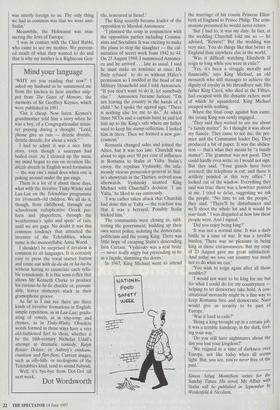Mind your language
`WHY are you reading that now?' I asked my husband as he summoned me from the kitchen to hear another snip- pet from The Gates of Memory, the memoirs of Sir Geoffrey Keynes, which were published in 1981.
`Got it cheap. Now listen. Keynes's grandmother told him a story when he was a boy, of a Congregationalist minis- ter praying during a drought. "Lord, please give us rain — drizzle drozzle, drizzle drozzle, for about a week." ' I had to admit it was a nice little story, even though a saucepan had boiled over. As I cleared up the mess, my mind began to run on iteration like drizzle drozzle in English word formation — the way one's mind does when one is poking around under the gas-rings.
There is a lot of it about these days, what with the iterative Tinky-Winky and Laa-Laa on the Teletubbies programme for 18-month-old children. We all do it, though, from childhood, through our schoolroom reduplicative Greek per- fects and pluperfects, through the weatherman's 'spits and spots' of rain, until we are gaga. No doubt it was this common tendency that attracted the inventor of the Teletubbies, whose name is the monosyllabic Anne Wood.
I shouldn't be surprised if iteration is common to all languages. It is certainly easy to press the vocal starter button and come out with da-da-da or ha-ha-ha without having to enunciate each sylla- ble consciously. It is this semi-reflex that allows Mr Kenneth Clarke to produce his curious he-he-he chuckle or, presum- ably, leaves stutterers stuck in their gramophone groove.
As far as I can see there are three kinds of iterative formations in English: simple repetition, as in Laa-Laa; gradu- ating of vowels, as in sing-song; and rhymes, as in Tinky-Winky. Obsolete words formed in these ways have a very old-fashioned feel to them, whether it be the 16th-century Nicholas Udall's attempt at dramatic comedy, Ralph Roister Doister, or Aubrey's crinkum- crankum and flim-flam. Current usages, such as silly-billy, or neologisms of the Teletubbies kind, tend to sound babyish.
Well, it's bye-bye from Dot-Dot till next week.
Dot Wordsworth










































































 Previous page
Previous page